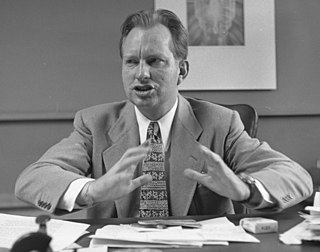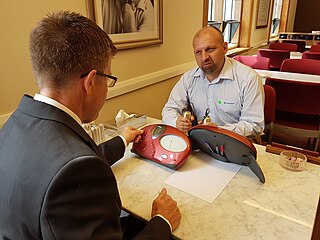
Dianetics is a set of pseudoscientific ideas and practices regarding the relationship between the human mind and body created by science fiction writer and Scientology founder L. Ron Hubbard. Dianetics is practiced by followers of Scientology and the Nation of Islam.

Lafayette Ronald Hubbard was an American author and the founder of Scientology. A prolific writer of pulp science fiction and fantasy novels in his early career, in 1950 he authored Dianetics: The Modern Science of Mental Health and established organizations to promote and practice Dianetics techniques. Hubbard created Scientology in 1952 after losing the intellectual rights to his literature on Dianetics in bankruptcy. He would lead the Church of Scientology, variously described as a cult, a new religious movement, or a business, until his death in 1986.

The Church of Scientology maintains a wide variety of beliefs and practices. The core belief holds that a human is an immortal, spiritual being (thetan) that is resident in a physical body. The thetan has had innumerable past lives, some of which, preceding the thetan's arrival on Earth, were lived in extraterrestrial cultures. Based on case studies at advanced levels, it is predicted that any Scientologist undergoing auditing will eventually come across and recount a common series of past-life events.

The Sea Organization, commonly known as the Sea Org, is a core managerial, fraternal, and paramilitary organization of the Church of Scientology. Members hold exclusive control of all Scientology management organizations, in addition to manning and operating a private naval force at several points throughout its history. The Sea Org is not directly incorporated into the structure of the Church of Scientology, but maintains a number of strict responsibilities for its members, beginning with a symbolic billion-year pledge of service to Scientology upon initiation. David Miscavige, the de facto leader of Scientology, is the highest-ranking Sea Org officer with the rank of captain, however the theoretically highest rank of commodore is instead held by the deceased L. Ron Hubbard, the founder of both Scientology and the Sea Organization. Some ex-members and scholars have described the Sea Org as a totalitarian organization marked by intensive surveillance and a lack of freedom.

In Scientology, Operating Thetan (OT) is a state of complete spiritual freedom in which one is a "willing and knowing cause over life, thought, matter, energy, space and time". The Church of Scientology offers eight "levels" of OT, each level costing thousands of US dollars. The OT levels are confidential and not revealed to Scientologists until they reach the third Operating Thetan level. In practice, the objective of these levels is to remove "body thetans" which are "confused, disembodied souls from other planets who have attached themselves to us".

Auditing, also known as processing, is the core practice of Scientology. Scientologists believe that the role of auditing is to improve a person's abilities and to reduce or eliminate their neuroses. The Scientologist is asked questions about past events while holding two tin cans attached to an electrical resistance meter (galvanometer) with a dial. The term "auditing" was coined by L. Ron Hubbard in his 1950 book Dianetics: The Modern Science of Mental Health which describes the procedure—in short, asking a person a question, getting an answer, and acknowledging the person for that answer.

Dianetics: The Modern Science of Mental Health, sometimes abbreviated as DMSMH, is a book by L. Ron Hubbard about Dianetics, a pseudoscientific system that he claimed to have developed from a combination of personal experience, basic principles of Eastern philosophy and the work of Sigmund Freud. The book is a canonical text of Scientology. It is colloquially referred to by Scientologists as Book One. The book launched the movement, which later defined itself as a religion, in 1950. As of 2013, New Era Publications, the international publishing company of Hubbard's works, sells the book in English and in 50 other languages.

Scientology and its perspectives on sexual orientation are based on the writings of L. Ron Hubbard, the founder of the Church of Scientology. His statements about homosexuality have led critics to assert that Scientology promotes homophobia, though these allegations are disputed by some Scientologists.

The Church of Scientology is a group of interconnected corporate entities and other organizations devoted to the practice, administration and dissemination of Scientology, which is variously defined as a cult, a business, or a new religious movement. The movement has been the subject of a number of controversies, and the Church of Scientology has been described by government inquiries, international parliamentary bodies, scholars, law lords, and numerous superior court judgements as both a dangerous cult and a manipulative profit-making business. In 1979, several executives of the organization were convicted and imprisoned for multiple offenses by a U.S. Federal Court. The Church of Scientology itself was convicted of fraud by a French court in 2009, a decision upheld by the supreme Court of Cassation in 2013. The German government classifies Scientology as an unconstitutional sect. In France, it has been classified as a dangerous cult. In some countries, it has attained legal recognition as a religion.

History of Dianetics and Scientology begins around 1950. During the late 1940s, L. Ron Hubbard began developing a mental therapy system which he called Dianetics. Hubbard had tried to interest the medical profession in his techniques, including the Gerontological Society, the Journal of the American Medical Association, and the American Journal of Psychiatry, but his work was rejected for not containing sufficient evidence of efficacy to be acceptable.

Silent birth, sometimes known as quiet birth, is a birthing procedure advised by L. Ron Hubbard and advocated by Scientologists in which "everyone attending the birth should refrain from spoken words as much as possible" and where "... chatty doctors and nurses, shouts to 'PUSH, PUSH' and loud or laughing remarks to 'encourage' are avoided". According to Scientology doctrine, this is because "any words spoken are recorded in the reactive mind and can have an aberrative effect on the mother and the child." Hubbard believed that breaking the silence during childbirth with words could adversely affect the child later in life. Church members believe that noises, sounds and words while a child is being born can possibly cause trauma, which in turn causes the production of engrams, thus necessitating silent birth. Scientologists believe that it is also a way to assist a newborn in his or her development spiritually.

Scientology: A History of Man is a book by L. Ron Hubbard, first published in 1952 under the title What to Audit by the Scientific Press of Phoenix. According to the author, it provides "a coldblooded and factual account of your last sixty trillion years." It has gone through many editions since its first publication and is a key text of the Church of Scientology. The book has been ridiculed by critics of Scientology for its unusual writing style and pseudoscientific claims; it has been described as "a slim pretense at scientific method ... blended with a strange amalgam of psychotherapy, mysticism and pure science fiction; mainly the latter."
This bibliography of Scientology includes Scientology-related books authored by L. Ron Hubbard and those produced by the Church of Scientology and its related organizations. Books compiled by the Church of Scientology and published after the death of Hubbard are usually indicated as "Based on the Works of L. Ron Hubbard".

Scientology and marriage, within the Church of Scientology, are discussed in the book The Background, Ministry, Ceremonies & Sermons of the Scientology Religion.

The beliefs and practices of Scientology include material related to sex and the rearing of children, which collectively form the second dynamic in Scientology. These beliefs and practices are based on the written works of Church of Scientology founder L. Ron Hubbard.

Scientology is a set of beliefs and practices invented by the American author L. Ron Hubbard, and an associated movement. It is variously defined as a cult, a business, a religion, a scam, or a new religious movement. Hubbard initially developed a set of ideas that he called Dianetics, which he represented as a form of therapy. An organization that he established in 1950 to promote it went bankrupt, and Hubbard lost the rights to his book Dianetics in 1952. He then recharacterized his ideas as a religion, likely for tax purposes, and renamed them Scientology. By 1954, he had regained the rights to Dianetics and founded the Church of Scientology, which remains the largest organization promoting Scientology. There are practitioners independent of the Church, in what is referred to as the Free Zone. Estimates put the number of Scientologists at under 40,000 worldwide.

Scientology was founded in the United States by science fiction author L. Ron Hubbard and is now practiced in many other countries.

The intersection of Scientology and abortion has a controversial history which began with Scientology founder L. Ron Hubbard's discussion of abortion in his 1950 book Dianetics: The Modern Science of Mental Health. Hubbard wrote in Dianetics that abortion and attempts at abortion could cause trauma to the fetus and to the mother in both spiritual and physical ways. Scientologists came to believe that attempted abortions could cause traumatic experiences felt by the fetus, which would later be remembered as memories referred to in Scientology as "engrams". In the Scientology technique called Auditing, Scientologists are frequently queried regarding their sexual feelings and behaviors. These questions about Scientologists' sexual behavior are often posed to members during "security checks", a specific form of auditing sessions where individuals are required to document their divergence from the organization's ethics. One of the questions asked in these security checks is, "Have you ever been involved in an abortion?".
The Clearwater Hearings were a 1982 Clearwater, Florida commission that investigated the Church of Scientology and Project Normandy.







